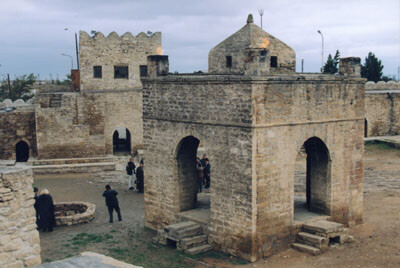
History
Azerbaijan in History
Professor Tadeusz Swietochowski
Columbia University
Azerbaijan, a stretch of land southeast of the Caucasus Mountain range, is geographically part of the Middle East, although, it is a border country, not part of the heartland. This borderland quality has been a major influence in shaping the country's history. From the time of ancient Media (8th - 7th century BC), Azerbaijan shared its destiny with Iran and maintained its Iranian character after the conquest by the Arabs in the mid-7th century AD, and the subsequent coming of Islam. Only in the 11th century, with the influx of Oghuz nomadic tribes, did Azerbaijan acquire a large proportion of Turkic inhabitants. The original Iranian population was fused with the immigrants, and gradually the Azeri Turkic language replaced the use of Persian. With the decline of Iran's state authority, new centers of power emerged in Azerbaijan in the form of khanates (principalities).
Castle in Ramani
Political fragmentation facilitated the conquest by Russia, and the Russo-Iranian wars ended with the 1828 Treaty of Turkmanchai. Azerbaijan was split along the Araz River with a larger part of its inhabitants remaining in Iran. For the northern part of the country, its passing under the rule of a European power, would be seen as a turning point in history. Initially, the Russian motivation was strategic-military, regarding Azerbaijan as a corridor for further expansion into Iran, but in the second half of the 19th century, economic factors came into force. Exploitation of the Azerbaijani oil resources increased rapidly, and the Russian held part of the country experienced lopsided industrialization, centered on the extraction of the mineral wealth around Baku. Oil became for Azerbaijan what the Suez Canal was for Egypt - sometimes a blessing, sometimes a curse, and always an attraction for foreign involvement.
The Revolution of 1905, which shook the foundation of Russian autocracy, ushered in a period of political awakening with the emergence of parties, free press and modern ideologies. In World War I, especially in its last year, Baku became the target of operations for all armies active in the region, and the city passed from Russian into Ottoman Turkish, and then into British hands. With Russia submerged in its civil war, Azerbaijan was ready to proclaim its independence in 1918. The independent Democratic Republic of Azerbaijan survived for two years, until the invasion by the Red Army forces, dispatched to seize the Baku oil fields in April 1920.
As a Soviet republic, Azerbaijan shared in the experiences of the other parts of the Soviet Union including: forcible collectivization of agriculture, industrialization geared to the needs of the USSR, educational progress, and political repression and Stalin's purges, as well as strict isolation from the outside world. By the next World War, the Caspian coast became an objective of Hitler's offensive, a grandiose operation that hinged on the outcome of the battle of Stalingrad. After the war, a slow but steady decline of the oil industry set in, an effect of underinvestment and overexploration. General stagnation became the hallmark of the Soviet regime in its decline. A new period of political awakening began only in 1988, sparked by the ethnic conflict, after Armenia raised its claims to the district of Nagorno-Karabakh. In the wake of a national emergency, new political groups, notably the People's Front of Azerbaijan, challenged the power of the Communist Party. 
"Atashgah" temple of Zoroastrians in Surakhani
Upon dissolution of the USSR, Azerbaijan became an independent republic under the presidency of the former Communist, Ayaz Mutalibov. The first years of the regained independence were marked by political instability, a condition made worse by the main national concern, the Nagorno-Karabakh war. The failure to stem the Armenian successes in the battlefields led to the replacement of Mutalibov, in 1992, by the head of the People's Front, Abulfaz Elchibey. However, the Karabakh conflict continued to be the nemesis of Azerbaijani leaders. After the loss of almost one fifth of the country's territory, a military coup deposed Elchibey. Heydar Aliyev, a former Communist leader, filled the power vacuum. He ended the fighting over Karabakh with the 1994 cease-fire agreement, although the peace settlement is still the subject of negotiations. The Contract of the Century, signed with an international consortium of oil companies, has led to the influx of foreign investments. Azerbaijan began its integration with the global economy through a process entailing the construction of the Main Export Pipeline, that would link the Caspian oil deposits with the Mediterranean coast of Turkey. Azerbaijan adopted a pro-Western foreign policy, but avoids antagonizing Russia, still the chief geopolitical factor in the region, a major trading partner and the outlet for mass labor migration. This political orientation reflects the concern for reviving the oil industry and insuring pipeline transportation to world markets in the condition of optimal safety and stability.


|
flat72.jpg)

flat72.jpg)
